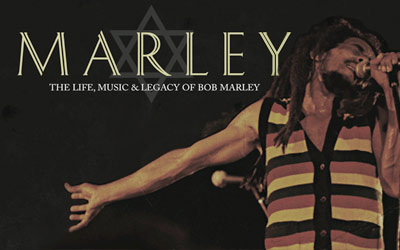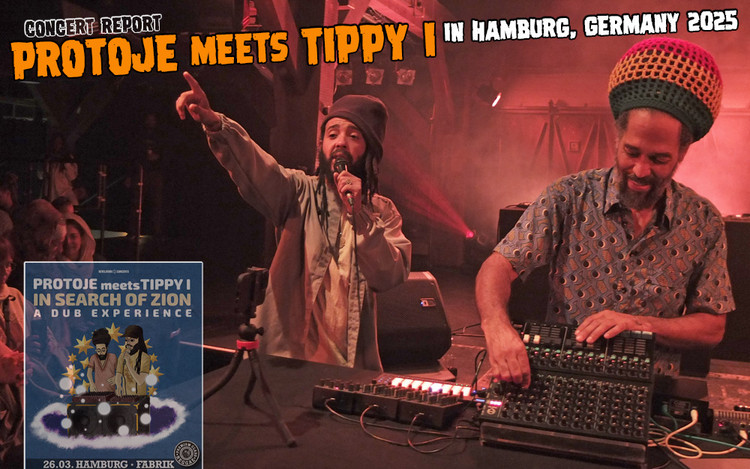Bunny Wailer ADD
Film-Review: Marley - The Life, Music & Legacy of Bob Marley
02/12/2012 by Larson Sutton

The irony of Marley, a new documentary directed by Kevin Macdonald (Last King of Scotland), is that by de-emphasizing the legend of reggae pioneer Bob Marley, and focusing instead on the man, it elevates this near-mythical Jamaican musician born to the hilly countryside of St. Ann to new heights. The more his path from poverty to prophet unfurls on the screen, the more appreciated and authentic he becomes. It isn’t without omissions and lingering questions that Macdonald accomplishes this, but it isn’t for lack of care or to the film’s detriment, either.
At a running time of 144 minutes, Marley tells its story relatively chronologically and as a journey. Opening with beautifully chilling location and helicopter shots, the first act charts the unlikely course of a half-caste farm boy who as a teen moves to an urban ghetto for an opportunity of a better life. It is in the slums of Trenchtown that Marley sees inevitability; get out or be taken out by police.
From the beginning, race, religion, and politics play prominent roles. Marley’s identity is shaped by each in profound ways, as so many of the songs he would pen are drawn directly from his life experience. It can be concluded that without this struggle he could very well have ended up a mere statistic of the impoverished island nation. The film is not shy to these subjects and there are some surprising and unique sequences involving Marley’s cousins that prove revelatory.
Never lingering too long on any one aspect, the film’s pace balances the need to highlight the critical points with the desire to avoid indulgence. Easily the entire documentary could have spent two hours on the Wailers’ early years, but instead captures the essence of the time, the pivotal moments, rather than too detailed a telling. No better is this handled than in the interviews with Bunny Wailer, the lone survivor of the original trio of Marley, Peter Tosh, and Wailer, himself. Wailer, also one of the movie’s producers, is candid and engaging, never revisionist or sparing. Demonstrating the reggae riddim by dancing it out on his front step, Wailer’s presence delivers the legitimacy and credibility only one who was there could provide.
He is not alone, but one of many offering first-hand accounts. Archival interviews of Marley are mixed with present-day narratives from family, friends, band members, and associates. This, however, raises the first of a few critiques. As told in the film, Marley fathered 11 children with seven women, yet only his first two children, son Ziggy and daughter Cedella, are present. While their contributions are ultimately essential to the documentary’s success, the lack of input from the other nine, including prominent reggae musician scions like Stephen and Damian, can’t help but be noticed. Perhaps the two eldest were chosen to represent the family, but nonetheless this remains a curiosity.
Equally conspicuous in its absence is much of Marley’s recording history. There is almost no discussion of his songwriting technique, time in the studio, or most obviously, no mention of albums as seminal in the catalog of 20th century music, let alone in the history of reggae, as Burnin’, Rastaman Vibration, or Survival. In fact, the Island output and the insight provided by producer Chris Blackwell were utilized more as corroborative along the timeline rather than as occasion to display or detail Marley’s musical acumen. At one point, Marley’s affinity for football is given equal time, (perhaps more), to that of the recording of Exodus, a record Time magazine called the album of the century.
It’s possible, though, that this is the ultimate triumph of the movie. That regardless of the classification of itself as a documentary, it holds true to the traditional arc of a great story. It does so smartly, without pandering to any of the myriad conspiracy theories on Marley’s attempted assassination or death that run rampant on the internet, or to the posthumous stereotyping as a Rasta rockstar of stoned-out collegians. The facts are still there, but the same facts can be found in the volumes written about reggae or its Third World hero Bob Marley.
The movie’s real treasures are found in the looks on the faces of his fellow travelers. The tones of voice, the smiles, the humor, the tears welling up in the eyes; these tell the true story of their journey together. There are occasional competing memories and contentions, but universal is the emotion that one can see and hear when each is discussing the man.
Finally, the documentary is pleasantly without any hindering subtitles, stated or implied. This isn’t, Marley; Life of a Reggae Superstar, or Marley; Enemy of the State, Hero of the People. It’s Marley, and simply it’s the most complete cinematic thought ever issued on this most mortal and transcendent of men.
Marley was premiered in Berlin, Germany [February 12th] and will hit cinemas worldwide in April/May 2012









